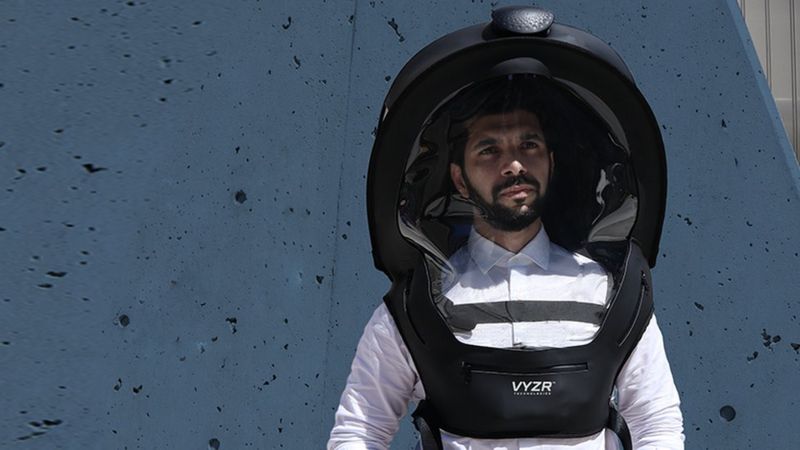

1. standard (n)
a level of quality
2. stale (adj)
no longer new or fresh, usually as a result of being kept for too long
3. security (n)
protection of a person, building, organization, or country against threats such as crime or attacks by foreign countries
4. appeal (n)
the quality in someone or something that makes him, her, or it attractive or interesting
5. filtration (n)
the act of passing a liquid or gas through a piece of equipment in order to remove solid pieces or other substances
6. visor (n)
a part of a helmet that can be pulled down to cover the face
Inventors design high-tech helmets for Covid protection

For the past two months inventor Yezin Al-Qaysi has been riding the Toronto subway in Canada wearing a huge black “mad helmet”.
The hazmat (hazardous materials) helmet completely encloses his head and upper torso, and has a visor that extends all the way down to his chest. On the back is a battery-powered fan and filter respirator system that purifies air that is sucked in, and pushes “stale” air out.
His is called the BioVYZR, and the battery is said to last for up to 12 hours. The Canadian says that his business – VZYR Technologies – now has sales in the “tens of thousands” mark.
But with a coronavirus vaccine having been announced last week, are helmets like these really necessary? Michael Hall, whose firm sells a PAPR helmet called Air, believes they will be popular in the longer term with people concerned about bad air quality.
Yet whether for protecting against airborne viruses or bad air quality, are such helmets a bit over-the-top? Natasha Duwin, whose Florida-based firm Octo Safety Devices makes face masks, says she can see the appeal.
“Helmets have the advantage that they show people’s faces,” she says. “You can see smiles and human expressions, and have a very strong sense of security.
“Yet because each one of these helmets depends on at least two filtration systems, batteries, and [other things], all these items can break down. And if only one of them breaks down, you are in serious trouble.”
She also cautions that the helmets will need to be thoroughly cleaned before each use.
Ms. Duwin says that for most people, all they need is a fitted, respirator mask that meets the certified quality standard in that country. Respirator masks have inbuilt filters, and both fit more tightly, and work more effectively, than simple fabric face masks.
Resource: https://www.bbc.com/news/business-54916159

- Why can’t scientists agree on the effectiveness of face masks?
- Would you feel safer wearing a face mask?
- What did you think when you read the headline?
“We understand how dangerous a mask can be. We all become what we pretend to be.”
Patrick Rothfuss

 Advanced
Advanced



